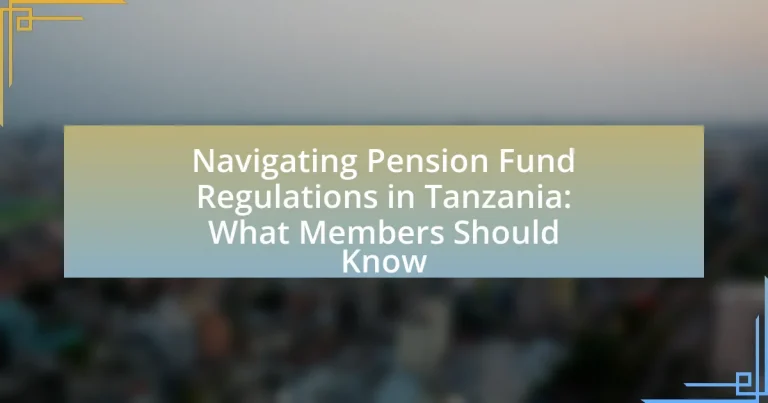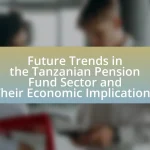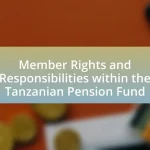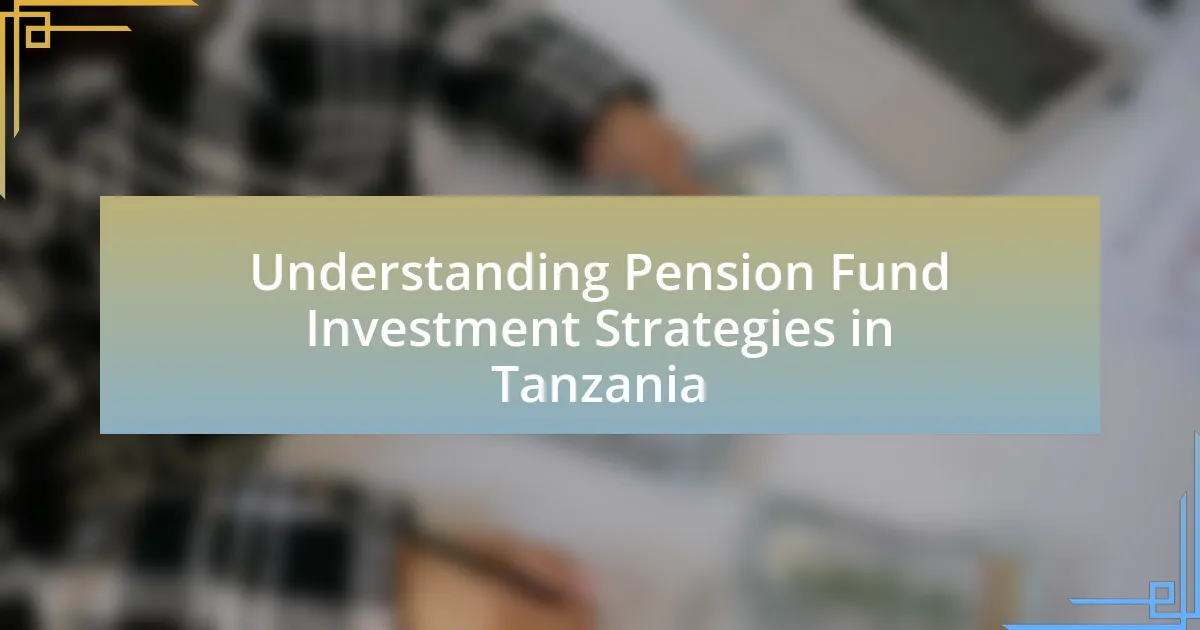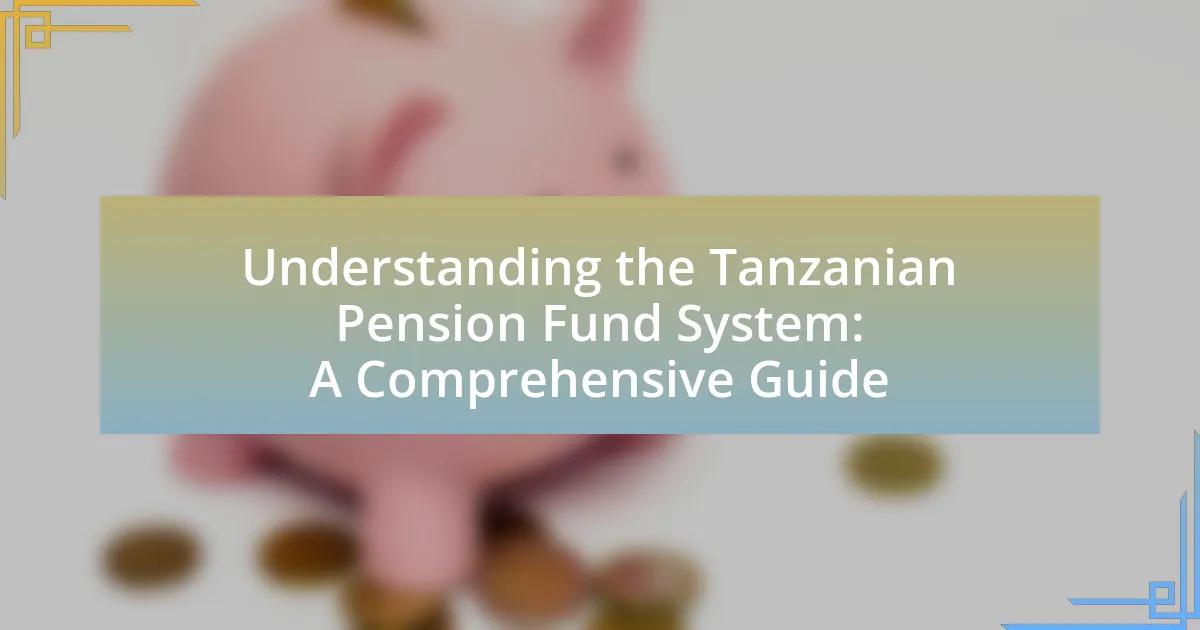The article focuses on the key pension fund regulations in Tanzania, primarily governed by the National Pension Fund Act of 1997 and the Social Security Regulatory Authority Act of 2008. It outlines how these regulations impact members by ensuring the protection of their contributions and benefits, as well as their rights to access information and benefits. The article also discusses the roles of regulatory bodies, the responsibilities they hold towards members, and the challenges members face in navigating the pension fund landscape. Additionally, it provides guidance on best practices for managing pension funds, maximizing benefits, and engaging with fund managers, ensuring members are well-informed about their rights and responsibilities within the pension system.
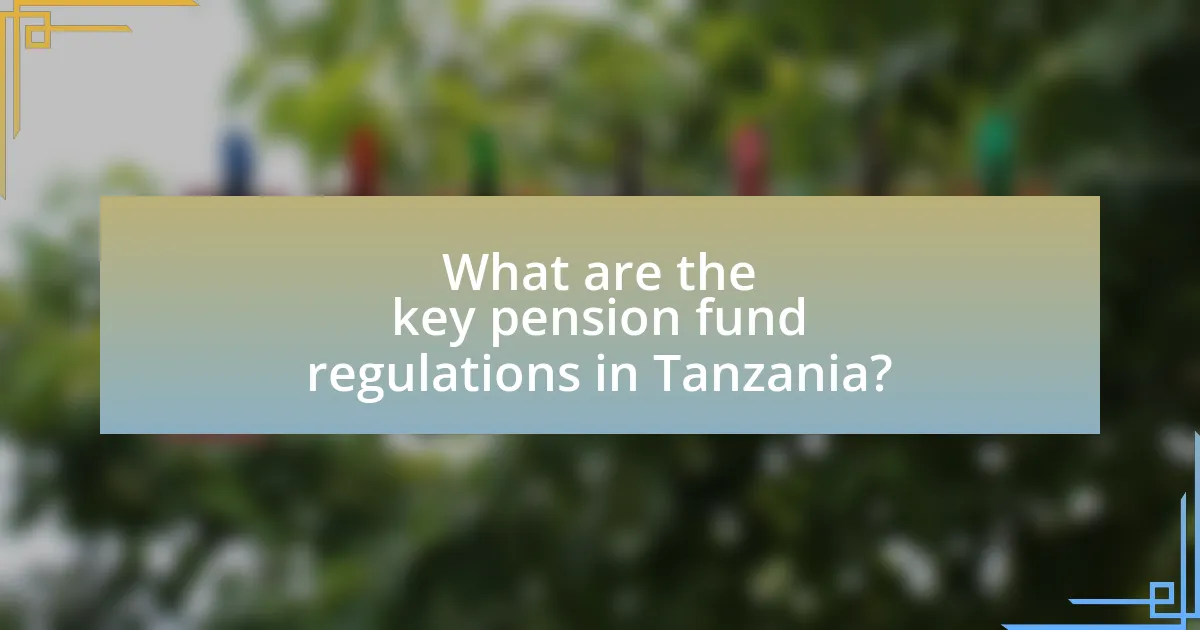
What are the key pension fund regulations in Tanzania?
The key pension fund regulations in Tanzania are primarily governed by the National Pension Fund Act of 1997 and the Social Security Regulatory Authority Act of 2008. These regulations establish the framework for the management and operation of pension funds, ensuring that they are adequately funded and that members receive their benefits upon retirement. The regulations mandate that pension funds must maintain a minimum funding level, adhere to investment guidelines, and provide transparency in their operations. Additionally, the regulations require pension funds to be registered with the Social Security Regulatory Authority, which oversees compliance and protects members’ interests.
How do these regulations impact pension fund members?
Pension fund regulations in Tanzania significantly impact members by ensuring the protection of their contributions and benefits. These regulations mandate that pension funds maintain a certain level of solvency and transparency, which safeguards members’ investments and provides them with a clearer understanding of their financial status. For instance, the Pension Reform Act of 2008 requires funds to disclose their financial statements, allowing members to assess the performance of their pension schemes. This transparency fosters trust and encourages informed decision-making among members regarding their retirement savings.
What rights do members have under these regulations?
Members have the right to receive benefits as stipulated in the pension fund regulations, which include the right to access their accrued pension savings upon retirement, disability, or death. Additionally, members are entitled to receive information regarding their pension fund, including statements of their contributions and benefits. These rights are protected under the Pension Act of Tanzania, which mandates transparency and accountability from pension fund administrators, ensuring that members can make informed decisions about their retirement savings.
How are pension contributions regulated?
Pension contributions in Tanzania are regulated primarily by the National Pension Act and the Social Security Regulatory Authority (SSRA). The National Pension Act establishes the legal framework for pension schemes, outlining the requirements for contribution rates, eligibility, and the management of pension funds. The SSRA oversees compliance with these regulations, ensuring that pension schemes adhere to the stipulated contribution rates, which are typically set as a percentage of an employee’s salary. For instance, the mandatory contribution rate for employees is currently 10% of their gross salary, while employers contribute an additional 10%. This regulatory structure is designed to protect the interests of members and ensure the sustainability of pension funds.
What are the roles of regulatory bodies in Tanzania’s pension sector?
Regulatory bodies in Tanzania’s pension sector oversee compliance, ensure financial stability, and protect the interests of pension fund members. The main regulatory authority, the Pension Funds Regulatory Authority (PPFRA), establishes guidelines for fund management, monitors fund performance, and enforces regulations to safeguard members’ contributions. Additionally, these bodies conduct audits and assessments to ensure transparency and accountability within pension schemes, thereby fostering trust among stakeholders.
Who are the main regulatory authorities overseeing pension funds?
The main regulatory authorities overseeing pension funds in Tanzania are the Pension Funds Regulatory Authority (PFRA) and the Bank of Tanzania (BoT). The PFRA is responsible for the regulation and supervision of pension funds, ensuring compliance with the Pension Act and protecting the interests of members. The Bank of Tanzania oversees the financial stability of the pension sector, particularly in relation to investment activities. These authorities work together to ensure that pension funds operate within the legal framework and maintain the financial security of members’ contributions.
What are the responsibilities of these authorities towards members?
The responsibilities of pension fund authorities towards members include ensuring the protection of members’ contributions, providing transparent information about fund management, and facilitating access to benefits upon retirement or other qualifying events. These authorities are mandated to oversee the proper administration of pension funds, ensuring compliance with regulations that safeguard members’ interests. For instance, the Pension Act of 2008 in Tanzania outlines the obligations of the National Pension Fund Regulatory Authority to monitor pension schemes and ensure that members receive timely and accurate information regarding their entitlements.
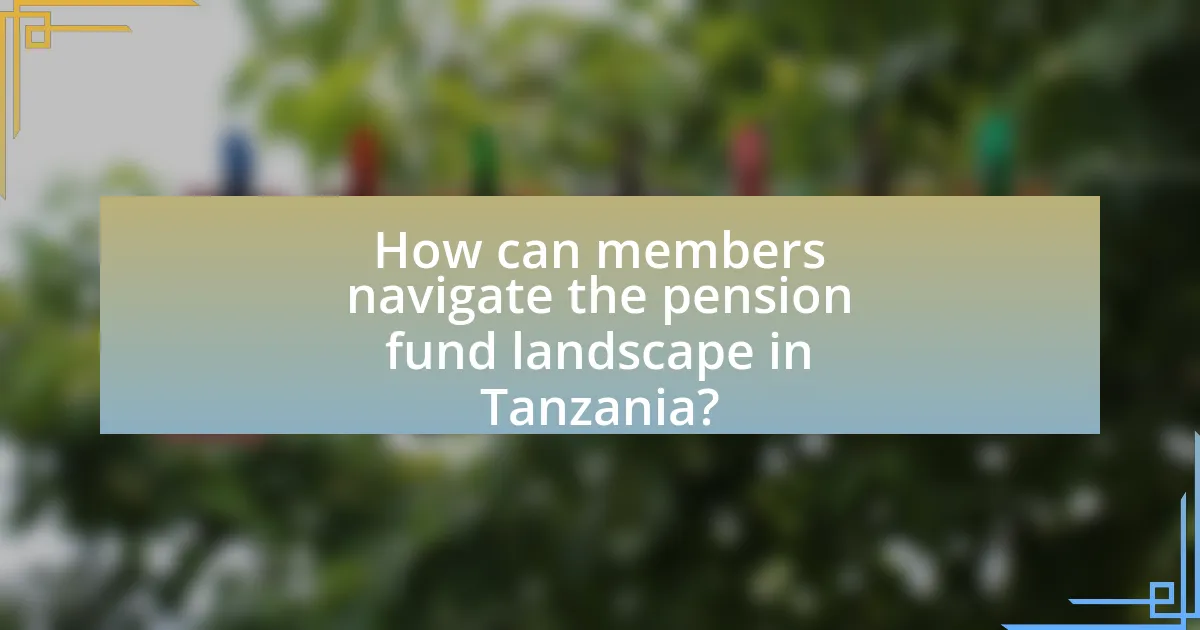
How can members navigate the pension fund landscape in Tanzania?
Members can navigate the pension fund landscape in Tanzania by understanding the regulatory framework and the various pension schemes available. The Pension Act of 2012 governs the operations of pension funds, ensuring that members are protected and informed about their rights and benefits. Members should familiarize themselves with the different types of pension schemes, such as the National Social Security Fund (NSSF) and the Parastatal Pension Fund (PPF), which offer distinct benefits and contribution rates. Additionally, members can access resources from the Social Security Regulatory Authority (SSRA) to obtain information on fund performance, member rights, and the claims process, ensuring they make informed decisions regarding their retirement savings.
What steps should members take to ensure compliance with regulations?
Members should regularly review and understand the specific regulations governing pension funds in Tanzania. This involves familiarizing themselves with the Pension Act and any relevant guidelines issued by the National Pension Fund Regulatory Authority (NPFRA). Additionally, members should participate in training sessions or workshops provided by their pension fund to stay updated on compliance requirements. Engaging with legal or financial advisors can also help clarify complex regulations and ensure adherence. Regularly checking for updates on regulatory changes is crucial, as non-compliance can lead to penalties or loss of benefits.
How can members verify the legitimacy of their pension fund?
Members can verify the legitimacy of their pension fund by checking its registration with the National Social Security Fund (NSSF) or the Pension Funds Regulatory Authority (PFRA) in Tanzania. These regulatory bodies maintain a list of registered pension funds, ensuring compliance with national laws and regulations. Additionally, members should review the fund’s financial statements and annual reports, which provide transparency regarding its operations and financial health. Engaging with the fund’s management and seeking independent financial advice can further confirm its legitimacy and reliability.
What documentation is required for pension fund transactions?
Pension fund transactions in Tanzania require specific documentation, including a valid identification document, such as a national ID or passport, proof of employment, and completed transaction forms provided by the pension fund. These documents are essential to verify the identity of the member, confirm their eligibility, and ensure compliance with regulatory requirements set by the Pension Act of 2008. Additionally, any withdrawal or transfer requests must be accompanied by supporting documents, such as bank statements or proof of account ownership, to facilitate the transaction process accurately.
What common challenges do members face regarding pension fund regulations?
Members face several common challenges regarding pension fund regulations in Tanzania, including lack of transparency, complex regulatory frameworks, and limited access to information. These challenges hinder members’ understanding of their rights and benefits, as many regulations are not clearly communicated or are difficult to navigate. For instance, a study by the Bank of Tanzania in 2021 highlighted that only 30% of members felt adequately informed about their pension rights, indicating a significant gap in communication and education. Additionally, the frequent changes in regulations can create confusion, making it difficult for members to keep up with their entitlements and obligations.
How can members address disputes with pension fund administrators?
Members can address disputes with pension fund administrators by first reviewing the pension fund’s internal dispute resolution procedures. These procedures typically outline the steps for filing a complaint, which may include submitting a written grievance to the administrator, providing relevant documentation, and allowing a specified timeframe for the administrator to respond. According to the Pension Act in Tanzania, members have the right to seek resolution through these established channels before escalating the matter to regulatory bodies such as the Pension Funds Regulatory Authority (PFRA) if necessary. This structured approach ensures that disputes are handled systematically and in accordance with legal requirements.
What resources are available for members seeking assistance?
Members seeking assistance can access various resources, including dedicated helplines, informational websites, and in-person support centers. These resources provide guidance on pension fund regulations, eligibility criteria, and benefits available under Tanzanian law. For instance, the National Social Security Fund (NSSF) offers a comprehensive website with FAQs and contact information for direct inquiries, ensuring members can obtain accurate and timely assistance. Additionally, local offices are available for face-to-face consultations, enhancing accessibility for members needing personalized support.
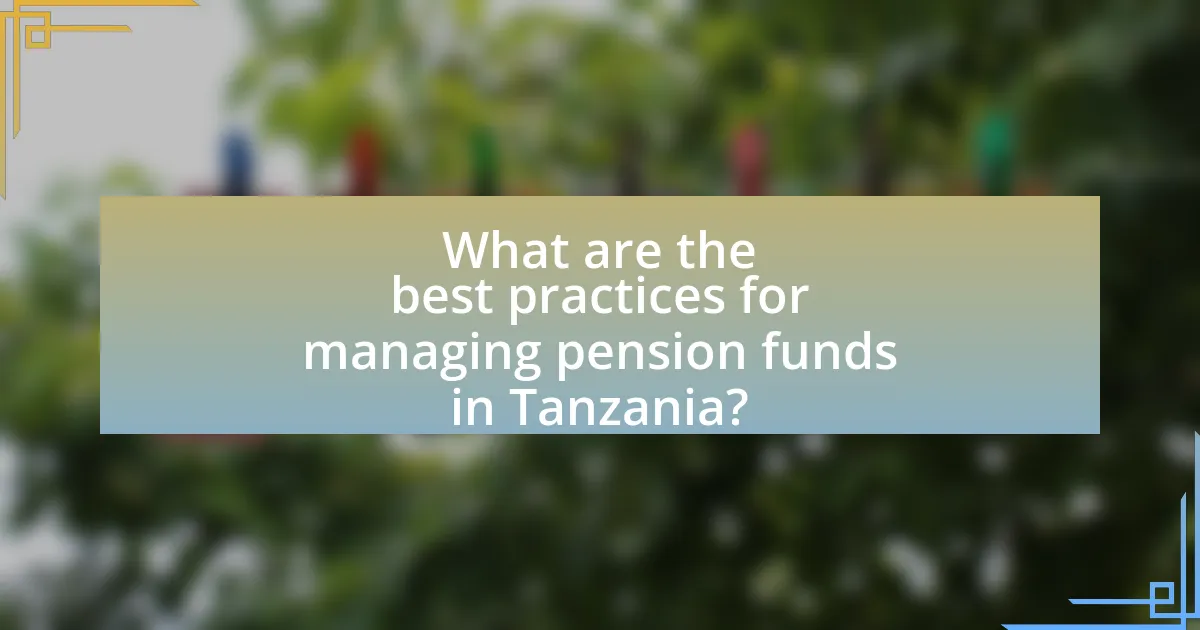
What are the best practices for managing pension funds in Tanzania?
The best practices for managing pension funds in Tanzania include ensuring compliance with regulatory frameworks, maintaining transparency in operations, and adopting prudent investment strategies. Compliance with the National Social Security Fund (NSSF) regulations and the Pension Act is crucial, as it establishes the legal framework for fund management. Transparency in financial reporting and governance fosters trust among members and stakeholders, while prudent investment strategies, such as diversification of assets and risk management, enhance fund performance and sustainability. These practices are supported by the need for effective oversight and regular audits to ensure accountability and protect members’ interests.
How can members maximize their pension benefits?
Members can maximize their pension benefits by contributing the maximum allowable amount to their pension fund and ensuring they take advantage of any employer matching contributions. In Tanzania, the Pension Act allows members to contribute up to 20% of their salary, which can significantly enhance their retirement savings. Additionally, members should regularly review their investment options within the pension fund to select those that align with their risk tolerance and long-term financial goals, as higher returns can lead to increased benefits at retirement. Engaging with financial advisors and staying informed about changes in pension regulations can also help members make informed decisions that optimize their benefits.
What investment strategies should members consider?
Members should consider a diversified investment strategy that includes a mix of equities, fixed income, and alternative investments. Diversification reduces risk by spreading investments across various asset classes, which can help stabilize returns over time. For instance, historical data shows that a balanced portfolio with 60% equities and 40% fixed income has historically provided a reasonable return while mitigating volatility. Additionally, members should evaluate local investment opportunities in Tanzania, such as real estate or infrastructure projects, which can offer growth potential aligned with national economic development.
How can members stay informed about regulatory changes?
Members can stay informed about regulatory changes by subscribing to official communications from the Tanzanian Pension Fund Regulatory Authority (TPFRA). The TPFRA regularly publishes updates, guidelines, and newsletters that detail any changes in regulations affecting pension funds. Additionally, members can participate in workshops and seminars organized by the TPFRA or related financial institutions, which provide insights into new regulations and their implications. Engaging with professional associations and online platforms dedicated to pension fund discussions also helps members stay updated on regulatory developments.
What tips can help members effectively engage with their pension funds?
Members can effectively engage with their pension funds by regularly reviewing their fund statements and understanding their investment options. Regularly checking fund statements allows members to track performance and ensure contributions are correctly allocated. Understanding investment options helps members make informed decisions that align with their financial goals. Additionally, participating in educational workshops or seminars offered by pension funds can enhance members’ knowledge about their rights and responsibilities, further empowering them to manage their pensions effectively.
How can members participate in pension fund governance?
Members can participate in pension fund governance by engaging in decision-making processes, attending meetings, and voting on key issues. In Tanzania, pension fund regulations allow members to influence governance through representation on boards and committees, ensuring their interests are considered. For instance, the Pension Act of 2018 mandates that members have the right to elect representatives to the board of trustees, which directly impacts fund management and policy decisions. This structured involvement empowers members to advocate for transparency and accountability within their pension funds.
What are the key questions members should ask their fund managers?
Members should ask their fund managers about the fund’s investment strategy, performance metrics, fees, and risk management practices. Specifically, they should inquire how the investment strategy aligns with their retirement goals, what benchmarks are used to measure performance, the total expense ratio including management fees, and how risks are assessed and mitigated. These questions are crucial as they provide insight into the fund’s operational transparency and alignment with members’ financial objectives, ensuring informed decision-making regarding their pension investments.
